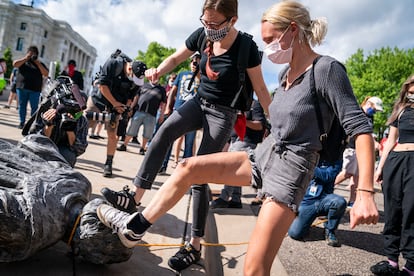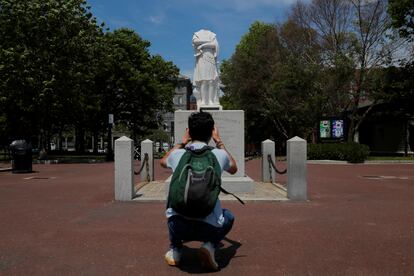Why Columbus Day continues to lose ground in the US
Joe Biden has become the first president to officially recognize Indigenous Peoples’ Day, against a background of growing rejection of the Genovese explorer’s legacy in the Americas

Joe Biden has become the first sitting president in the history of the United States to officially recognize and commemorate Indigenous Peoples’ Day, celebrated on the second Monday of October alongside Columbus Day. The latter is still part of the public calendar although recently it has been tempered by remembrance of the human rights abuses carried out during the conquest of the Americas.
Boston, in another first, decided to do away with the 15th-century explorer entirely and stage only events commemorating the country’s indigenous heritage. In New York, public schools unveiled a new joint initiative this year – Italian Heritage Day / Indigenous Peoples’ Day – that also eschewed any homage to Columbus. And in Philadelphia, after a court case that concluded last Saturday, the traditional parade ended at the foot of a statue of the Genovese seafarer, but one that was covered from head to foot in wooden packing boxes.
Controversy over the celebration of Columbus Day, acts of remembrance and monuments to the Conquistadors has been simmering in the US for years, but after the huge public protests that swept the country last summer in the wake of the death of George Floyd, the anti-colonization movement has gained traction. In a country immersed in a national catharsis over its history of slavery and the oppression of minorities, amid the revision of historical symbology and the removal of statues to Confederate leaders, it is difficult for the history of European colonization to pass unnoticed. And Christopher Columbus, despite the fact that he never set foot on what is today the United States or that he died believing he had discovered the West Indies, occupies a prominent place on the stand as one of the most enduring symbols of the conquest, of its glories and its miseries.
In the view of Roberto Múkaro Borrero, president of the Confederation of Taibo Peoples (the first tribe that Columbus came across when he landed in today’s Bahamas), the explorer “is not someone who should be honored with taxpayers’ money in a nationally recognized holiday; it is a date constructed on the foundations of mythology and racism and the fact that more and more cities are choosing to celebrate indigenous people instead is an indication of the need for change. [Columbus Day] is a symbol of supremacism and slavery.”

More than a dozen US states, from Michigan to Wisconsin via the District of Columbia – where Washington DC is located and which takes its name from the Genovese explorer – as well as a hundred or so cities, now celebrate Indigenous Peoples’ Day after the steady drip of the last five years during which statues of Columbus have been pulled from plinths across the country, albeit not without the occasional brawl.
The policy change affecting New York schools, which was decided in May, this year caused lofty criticism from former state governor Andrew Cuomo, who is of Italian descent. In Boston, Italian-American organizations have also criticized a lack of debate. A school district in New Jersey, which voted to remove any reference to Columbus, backtracked later this year.
The debate over Columbus, in contrast to the one over Confederate statues, has not resulted in a united front among Democrats, not just because of the obvious differences between these historical figures, but because Columbus Day came about in the US as a way to honor Italian and Catholic immigrants at a time when they were an especially mistreated community subjected to many xenophobic crimes. Franklin D. Roosevelt enshrined October 12 as a federal holiday in 1934 and, as of 1971, Columbus Day been celebrated on the second Monday of October, which is recognized as Italian-American Heritage Month.
The fact that Biden issued two separate presidential proclamations on October 8 – a new one in reference to indigenous people and the traditional one dedicated to Columbus – is evidence of the need for political equilibrium. In his proclamation for Columbus Day, the president acknowledged “the painful history of wrongs and atrocities that many European explorers inflicted on Tribal Nations and Indigenous communities.” In his Indigenous Peoples’ Day proclamation, Biden aimed the blame at domestic actors: “For generations, federal policies systematically sought to assimilate and displace Native people and eradicate Native cultures.”
Spain has, unsurprisingly, taken the controversy to heart. The Spanish Embassy has described the defense of the country’s legacy as “one of its priorities” and has carried out various acts in an attempt to safeguard the image of its history, and not just with regard to Columbus: from protests against the toppling of a statue of the missionary Fray Junípero de Serra last year in San Francisco to educational endeavors such as the Guide to Spain in Washington, which documents all the monuments and symbols referencing Spain in the US capital. Among these is a statue of the explorer that still stands on Columbus Circle outside Union Station.
The debate has flared up again recently after Mexico’s leftist president, Andrés Manuel López Obrador, questioned why Spain has not seen fit to ask for forgiveness for the abuses carried out during the conquest; his request was met with jeering incredulity by former conservative Spanish Prime Minister José María Aznar.
For now, Biden’s White House has opted for a conciliatory solution of celebrating both events, in line with Cuomo’s observation: “You can celebrate Indigenous Peoples’ Day without getting involved with Columbus Day. Why insult or dismiss the Italian contribution?”
Heather Leavell, the co-founder of the Boston-based Italian Americans for Indigenous Peoples’ Day, says however that “Italian heritage doesn’t have to be celebrated on the second Monday of October. We enjoy a level of status and recognition in society that native people do not and we should prioritize their feelings on this.”
The change in sensibility toward historical figures seems to be inexorable in the US. In Newark, New Jersey’s largest city, a design was presented this year for a new monument to Harriet Tubman, a heroine of the abolitionist movement who was born into slavery but escaped and later used the Underground Railroad to rescue dozens of enslaved people, including many of her own family. In 2020, in the same city, a statue of Columbus was taken down.
Tu suscripción se está usando en otro dispositivo
¿Quieres añadir otro usuario a tu suscripción?
Si continúas leyendo en este dispositivo, no se podrá leer en el otro.
FlechaTu suscripción se está usando en otro dispositivo y solo puedes acceder a EL PAÍS desde un dispositivo a la vez.
Si quieres compartir tu cuenta, cambia tu suscripción a la modalidad Premium, así podrás añadir otro usuario. Cada uno accederá con su propia cuenta de email, lo que os permitirá personalizar vuestra experiencia en EL PAÍS.
¿Tienes una suscripción de empresa? Accede aquí para contratar más cuentas.
En el caso de no saber quién está usando tu cuenta, te recomendamos cambiar tu contraseña aquí.
Si decides continuar compartiendo tu cuenta, este mensaje se mostrará en tu dispositivo y en el de la otra persona que está usando tu cuenta de forma indefinida, afectando a tu experiencia de lectura. Puedes consultar aquí los términos y condiciones de la suscripción digital.









































